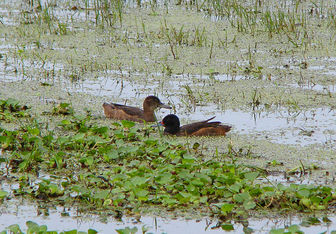Black-headed Duck
This is the most basal living member of its subfamily, and it lacks the stiff tail and swollen bill of its relatives. Overall much resembling a fairly typical diving duck. It is a small dark duck, the male with a black head and mantle and a paler flank and belly, and the female pale brown overall.

Original source: Marreca-de-cabeça-preta (Heteronetta atricapilla) - Casal em plumagem de reprodução
Author: Cláudio Dias Timm from Rio Grande do SulCamera location
The Black-headed Duck is classified as Least Concern. Does not qualify for a more at risk category. Widespread and abundant taxa are included in this category.
The black-headed duck of South America is one of these, but it stands out from all the others in a striking way. Black-headed ducks don't need any parental care other than incubation for their eggs-the ducklings leave the nest one day after hatching and paddle off into the reeds to fend for themselves. More
However, the black-headed duck lacks many of the traits of the stiff-tailed ducks, and in many anatomical features more closely approaches the dabbling ducks. In addition to providing an apparent evolutionary link with that group, the black-headed duck is also the only species of Anatidae that seems to have become a total social parasite, abandoning its nest-building tendencies in favor of dropping its eggs in the nests of a variety of host species. More
The Black-headed Duck (Heteronetta atricapilla) is a South American duck allied to the stiff-tailed ducks in the subfamily Oxyurinae of the family Anatidae. It is the only member of the genus Heteronetta. This is the most basal living member of its subfamily, and it lacks the stiff tail and swollen bill of its relatives. More
black-headed duck's big white egg stands out like a sore thumb in a nest full of speckled brown coot eggs. Apparently, the ducks have been unable to gradually evolve egg mimicry because their hosts are already attuned to detecting eggs laid by other birds of their own species, Lyon said. Mimicry would clearly be an advantage, because parasitic eggs of other coots are not rejected as often as duck eggs. More
Black-headed Duck is of interest as an obligate brood parasite, never nesting itself but laying its eggs in the nests of other birds instead. The hosts are particularly the Rosybill (Netta peposaca), but also other ducks, coots (Fulica species), and occasionally even gulls and birds of prey. Unlike for example certain cuckoos, neither the chicks nor adults destroy the eggs or kill the chicks of the host. More
black-headed duck (Heteronetta atricapilla) of South America, is an obligate nest-parasite, always laying in the nests of other... Other The following is a selection of items (artistic styles or groups, constructions, events, fictional characters, organizations, publications) associated with "black-headed duck" * brood parasitism (zoology) * obligate parasite Expand Your Research: Try searching magazines and ebooks for "black-headed duck". No results found. More
Facts about black-headed duck: reproductive behaviour, as discussed in anseriform (bird order): Reproductive behaviour: = ...(up to 22 in the mallard) are usually the work of more than one female. In the pochards and stifftails such nest-parasitism is so common that it influences breeding biology. Only one species, the black-headed duck (Heteronetta atricapilla) of South America, is an obligate nest-parasite, always laying in the nests of other... More
With different hosts, the black-headed duck's kinder, gentler version of brood parasitism might have been a highly successful evolutionary strategy. Instead, the species finds itself evolutionarily stranded, caught in the cross-fire of an internecine conflict among its hosts. "The adaptations that have arisen in coots to deal with the high costs of intraspecific brood parasitism have, in effect, inoculated this system against further coevolutionary adaptations on the part of the parasitic duck," Eadie said. More
Black-headed Duck at about 24 days is shorter than that of the host's eggs. When hatched the duckling spends only a few hours in the nest before it is off looking after itself. More
Black-Headed Duck Coupon = Black-Headed Duck Coupon larger image $19.95 - BONShops Home Contact Us Copyright More
black-headed ducks were being thwarted by defenses that had evolved as a result of brood parasitism among the coots themselves. The researchers carefully investigated the costs of duck parasitism to the hosts and found few costs that could be prevented by rejection of the duck eggs. More

Original source: Cl
Author: Cl
Permission: Some rights reserved
Family : Anatidae
Genus : Heteronetta
Species : atricapilla
Authority : (Merrem, 1841)

